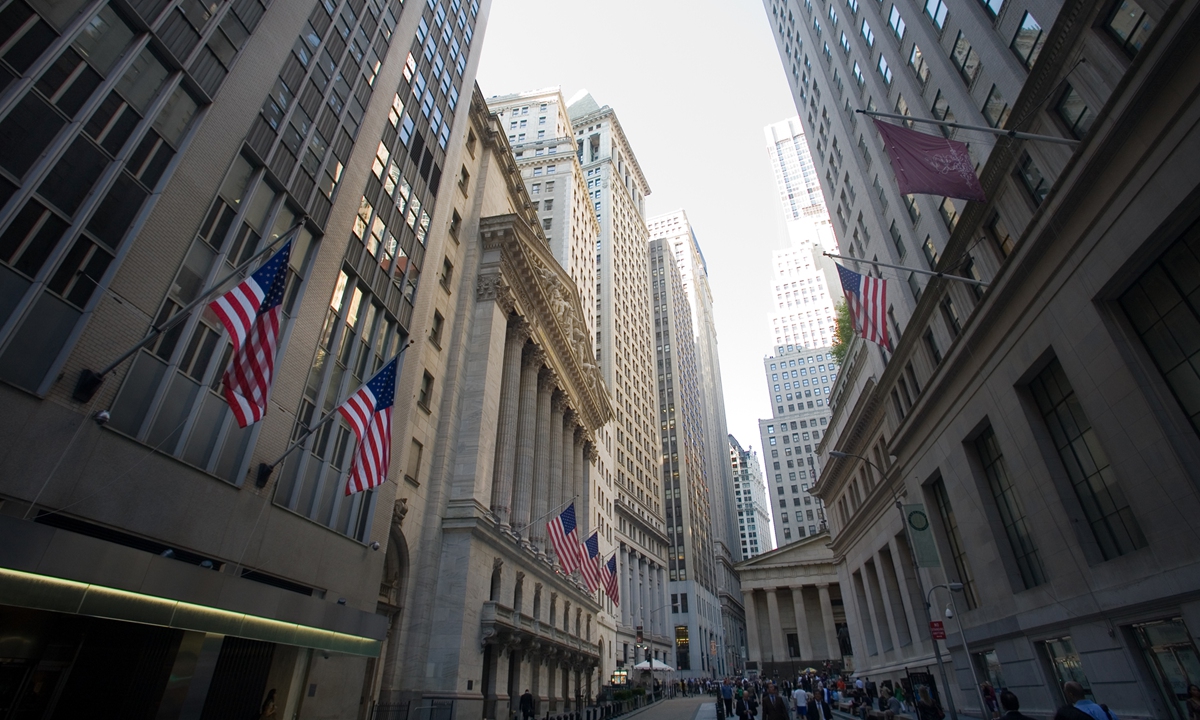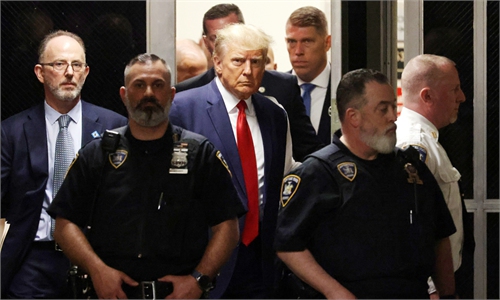Radical US lawmaker’s plan to ban financial investments in China, bully firms ‘self-destructive’

A view of Wall Street in New York, the US Photo: IC
As years of crackdowns against Chinese firms failed to contain China's rise, radical anti-China politicians in Washington have apparently resorted to self-destructive tactics of bullying US businesses for making handsome profits from the Chinese market.
In the latest move, Mike Gallagher, chair of the so-called China committee of the US House of Representatives, wrote a letter to US President Joe Biden, urging him to expand a reportedly forthcoming ban on certain US investments in China to cover US firms' purchases of Chinese stocks and bonds.
"Public market investments represent the majority of [US] capital flows to [China]. Any rules that exempt them will fail to address the bulk of the national security threat," Gallagher, who is known for his radical views on China rather than any sound domestic legislature that helps Americans, wrote in the letter posted online.
While it is widely reported that the Biden administration will issue an executive order to ban certain outbound US investments in critical technologies in China, it remains unclear the extent of such a ban. What's clear is that if Washington moves to restrict US investments in China's financial market, it will have profound implications given the enormous size of such investments.
Gallagher himself, citing "one estimate," pointed out that over $200 billion of US capital is invested in Chinese companies through private markets, and more than $1.1 trillion of US capital is invested through public markets in Chinese stocks and bonds.
Gallagher is not stopping at merely urging the White House to take such a radical step. He has actually taken concrete moves to target US financial companies in an attempt to bully them into abandoning the Chinese market. On Thursday, he threatened to issue subpoenas to BlackRock, the world's largest asset manager, and MSCI, a compiler of stock market indices, over their investments in China.
Chinese experts called such moves laughable and self-destructive, as they are actually punishing US companies for making profits from the Chinese market, which is crucial for the US economy, in a futile attempt to contain China.
On the surface, calls for such restrictions under the guise of "national security" appear popular amid the US' overall suspicious attitude toward China, but they are actually hurting the US economically, Xi Junyang, a professor at the Shanghai University of Finance and Economics, told the Global Times on Friday.
"For US financial institutions and investors, this means economic losses because many investment opportunities in China are great options that can bring great returns and profits," Xi said.
Chinese officials have long slammed the US' artificial restrictions on normal business cooperation with China based on a Cold War mentality and an over-stretched concept of national security, while at the same time taken concrete measures to further open up the Chinese market for global businesses, including US financial institutions.
In the latest example, the People's Bank of China (PBC), the central bank, and the State Administration of Foreign Exchange (SAFE), held a meeting on work for the second half of 2023 on Tuesday, vowing to expand international financial cooperation and financial opening-up.
Specifically, the PBC and the SAFE will simplify the procedures for foreign investors to invest in the Chinese market, enrich the types of investable assets, and facilitate foreign investors to increase their holdings of yuan assets, according to an official statement.
Wang Chunying, a spokesperson for the SAFE, said on Friday that equity investment in China recorded a net inflow of $32.3 billion in the first six months of 2023, with significant growth seen in investment in Chinese stocks and gradual rebound in investment in Chinese bonds.



